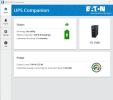Is it possible to use the cloud instead of a BI server to reduce energy use?
I don’t know if you’re joking or being serious.
So will give you the benefit of the doubt that’s a serious question being posed. As such here are some considerations with respect to local first vs cloud first.
Bandwidth: Your infrastructure must be able to support the bandwidth that’s required to send / receive the video data.
Meaning your infrastructure was designed from the ground up including the ISP connection to sustain this.
Storage: You’ll need to sit down and accept the price for data storage is going to be expensive. That your needs as it relates to data retention directly impacts the cost you’ll pay a year.
Which unlike a fixed system will never go up because you already paid for the hardware / storage.
Security: Your data is literally accessible by anyone in the company that you choose to have service with.
There are countless examples of people seeing a random persons feed. Accessing a complete strangers account just out of the blue?!?
Price: You’ll need to put pen to paper to see if all of this pencils out as it relates to a one time hardware investment & energy consumption vs cloud hosted.
But, you can guarantee dollars to donuts unless you’re on a contract the price will go up!
There are dozens of other reasons why going cloud first vs local first is a terrible idea!

Nobody remotely serious uses the cloud to run and store video security. They do use the cloud as another layer of backup and redundancy to store archive data!
That makes perfect sense because god forbid your house burned down to the ground or had a home invasion.
Nobody is going to be able to take / erase the data without your permission and consent.




